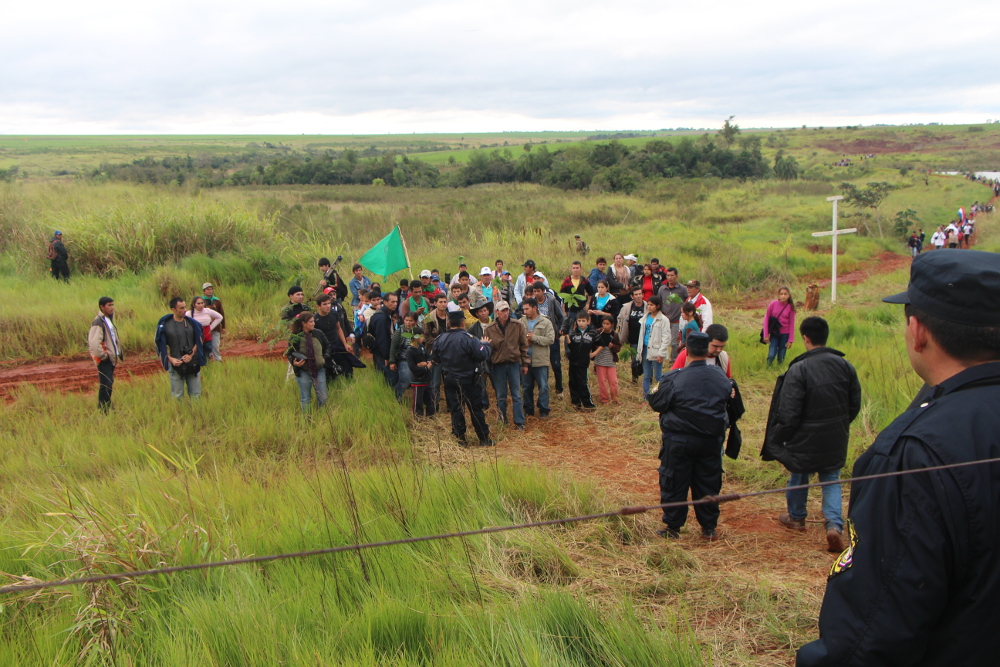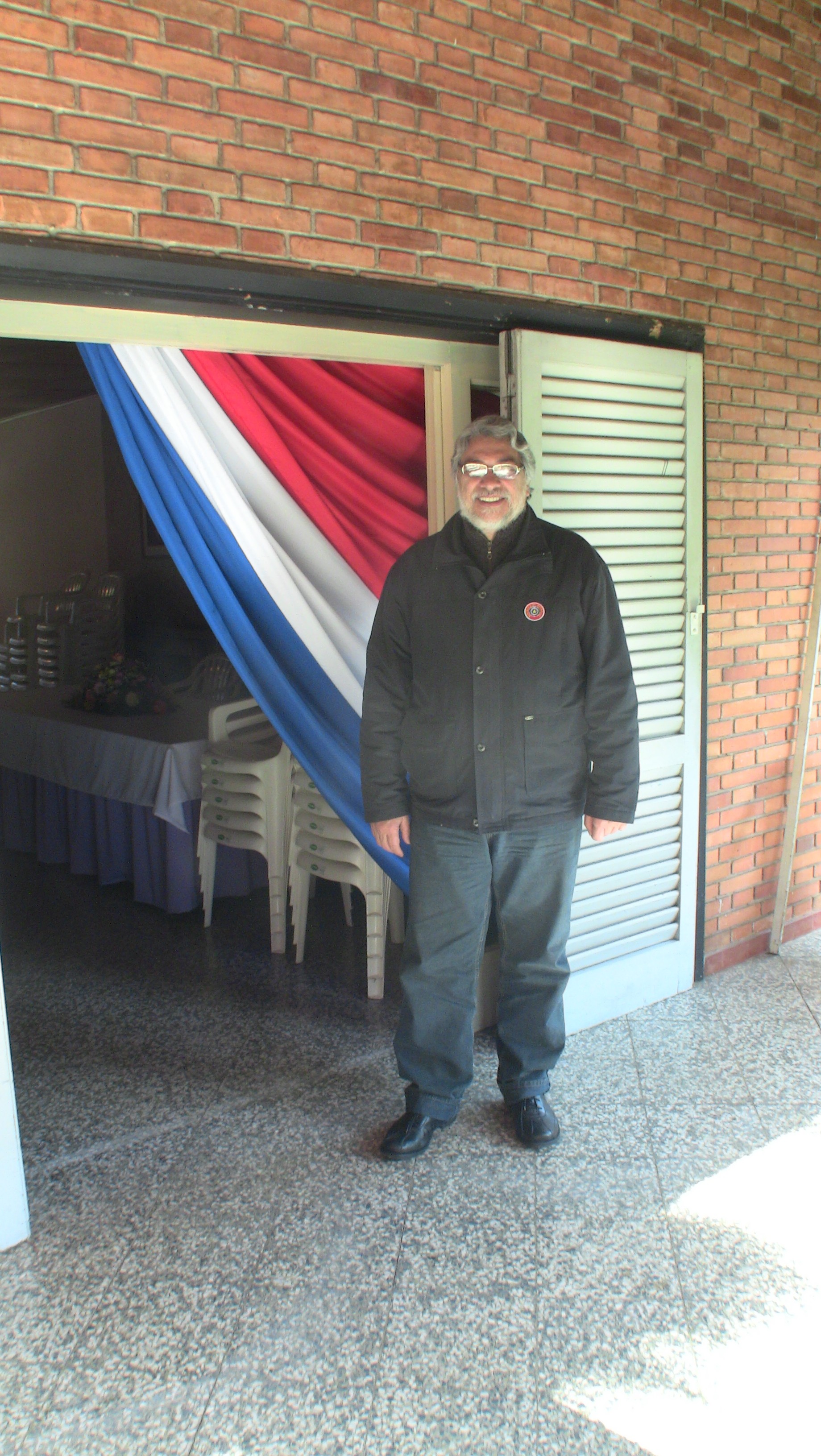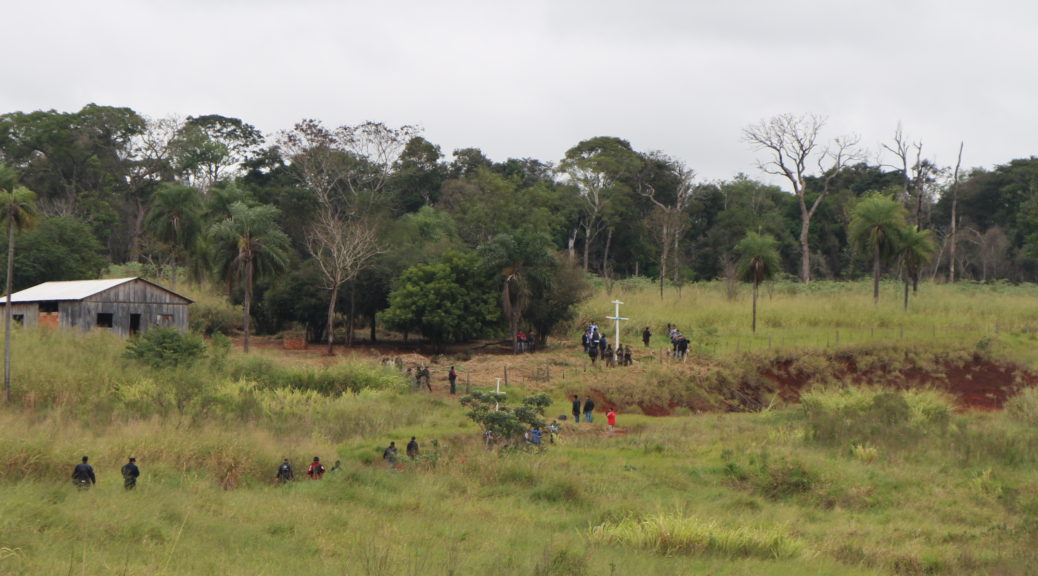It is now four years ago that the democratically elected President Fernando Lugo was removed from office by means of a parliamentary coup. The consequences of the coup continue to be felt in the country, and there is still no clarity about the exact circumstances of it. 11 landless peasants have recently been sentenced to long prison sentences, and a 12th accused is now on trial. At the same time, Lugo’s followers see an opportunity for to seize power again.
Previously published about Curuguaty in other languages:
German: Schatten des Staatsstreichs (Junge Welt)
Danish: Advokater og aktivister raser: »Bønder er idømt 120 års fængsel uden beviser« (Modkraft.dk)
Norwegian: Mysteriet om Curuguaty – den uløste massakren som felte presidenten (Radikalportal.no)
Spanish: #QuéPasóEnCuruguaty (Revolución 3.0)
The Paraguayan coup in 2012 followed a similar pattern as the coup in Honduras in 2009: A left-wing president with ties to the Venezuelan government with a relatively weak party organization was deposed in a relatively bloodless coup a few months before national elections. An internationally criticized interim government run by one neo-liberal party lead the country up to the elections which then were won by another neoliberal party. The new government after the elections could then govern without any formal links to the coup.
However, to initiate the coup, a reason was needed. Lugo had been elected based on a plan to carry out a land reform. In the end, he never was able to make that happen, but he was known to give small farmers a voice in politics. Under mysterious circumstances, on 15 June 2012, a week before the Lugo was ousted, 6 policemen and 11 landless peasants who had occupied fields outside the small town of Curuguaty were shot, when the police attempted to enter the occupied land to communicate with the farmers. After the massacre, Lugo was accused, among other things, of spreading “class hatred” in the country and of having instigated the peasants to do land occupations. For Parliament, this was enough reason to remove him from office
All this was long ago and Lugo is now a Senator with ambitions to become president again. It is mainly others who suffer from the consequences of the coup. 12 peasants have been charged with the crimes committed in Curuguaty that day.
11 of the defendants were given their verdict on July 11 2016. Although it was pretty clear that the shots that were fired during the massacre came from a type of large calibre weapon that the farmers didn’t have access to, the various laboratory results were very contradictory, and that the questioning of witnesses lead to more questions than answers, the verdict found the peasants guilty and they were sentenced to prison for 4 to 35 years each.
The 12th accused has still been sentenced. This is because this defendant was 17 at the time of the shooting, thus underage, which meant that her trial had to be held separately from that of the adults — but by the same judges. Because the judges were occupied with the trial of the adults, they postponed the trial of the minor until now. Sonia von Lepel defends the young woman, and she is quite concerned with how the process is conducted: “Paraguay has ratified the UN Children’s Convention. This should in theory make Paraguay follow special procedures for how minors are tried, with an extra emphasis on reintegration into society, and there should be specific legal structures to deal with minors. We are quite concerned because in Paraguay we don’t have any of that. They will have the judges judging the adults also sentence the minor.” Two of three of the judges of the adults resigned from the minor’s trial after judging the adults because they believed they already had given their opinion about the case.

The political left, which has been following the process over the last four years, has responded furiously to the verdict. As the judgment of the 11 defendants was announced, one could follow live on television as the the audience in the chamber starting protesting. Guillermina Kannonnikoff, a well-known activist who lost a husband to the dictatorship that lasted until 1989 and who herself had been sitting in prison during that time for political activity, jumped on a table and began to jump while the police tried to regain control. One of the judges tried to order the arrest of Kannonnnikoff, but this was without success. Halfway through reading out the sentence, the judges declared that for the sentence to have been read and they stormed out of the room. A little later they came back again, with even more police and they ordered for the rest of the sentences to be read out loud. At the end, the people in the audience occupied room and stayed overnight.
Kannonnikoff explained why this seemed to be the right thing for her to do at the moment: “The case of Curuguaty was something all of Paraguay followed. And still, they sentenced without proofs. The whole thing was just to send a signal that no-one here should dare do anything — especially peasant farmers. The conditions for small farmers and social movements have always been bad. But now the conditions are even worse. The politics of this country only serve large landowners and drug lords – the interests of all the others are not considered.”

Not knowing what really happened, but the official story being too incredible to believe, has meant that many have come up with their own theory surrounding the events. Ernesto Vera, a spokesperson for the solidarity group #NullidadYa ( “Void Now”) which has been organizing many of the protests in Paraguay’s capital Asunción in favor of the farmers thinks that it is “probably the police themselves who shot both police officers as well as the farmers. There were a number different special forces, helicopter crews, etc. in the area Totally 324 policemen were there on the spot. ” No matter what theory one chooses to believe in, most seem to have some opinion about the case. The activist Mario Casartelli sees the case as emblematic of the political problems of the country, declaring that “this case is the most important in Paraguay at the time. What use is there to try to improve various aspects of a society, if in the end, innocent people are placed in prisons? ”
The lawyer Hans Otto Kroeger, who assists the defense team of the accused adults, describes the political sensitivity of the sentence: “I had already counted on political pressure being applied, so that there would not be an acquittal, but some of my colleagues had hoped that perhaps only 2-3 of the defendants would be found guilty because the evidence was so bad. Still, all of us were surprised by the length of the sentences.” Kroeger believes that pressure came from “the highest level in politics” to come up with this sentence. Kroeger continues: “The Supreme Court ultimately represents the two traditional parties. If anyone there does something else than what is being ordered, then that person is immediately removed. This is even easier to do than in Lugo’s case, because no-one gets to be judge here without having some negative aspect to them that allows for blackmailing. We will now go to the 2nd and 3rd instance, and perhaps the sentences will be somewhat reduced, but larger changes will not happen before we get to international courts “.
Asunción, April 2016: One of many mini protests asking for acquittal of the campesinos.
In parliamentary politics, the situation for the left looks a little better. After the sentence, President Cartes said that the judiciary will continue to deal with the case. He also said that he himself was not part of the government installed “after the coup.” Cartes giving such a declaration probably has to do with the general political situation. Initially, Cartes was actively trying to make the country more attractive to foreign capital by confronting peasant farmers and the poor at every level, a protest of 23 days in April 2016 by small farmers and cooperatives in Asunción ended with a compromise. Although the farmers protest now again for the implementation of the promises of the government, the fact that the government was ever willing to negotiate with the farmers was a step forward. The protest had been the longest since the introduction of formal democracy in 1990 in Paraguay.
Even at the elections, the Left seems to have chances. When Lugo was elected in 2008, this was largely because he was known as a Catholic priest. In Parliament he had little support and he had to cooperate with the Liberal party, which could initiate the coup against him in the end. That has now changed. In November 2015, the Left Mario Ferreiro won the mayoral elections of the capital Asunción, ending 15 years rule of the conservative Colorado Party. And for the presidential election in 2018, also Lugo is set up as a candidate of what his supporters will end up being a broad alliance of left and centrist parties. Polls in the course of the last year have shown that Lugo is more popular than Cartes. However, it is still not clear whether Lugo will be eligible to be elected to the office of president again because he didn’t fully serve his first term, or whether this will be considered a re-election.
A second term of Lugo, this time with the support of the Left parties in Parliament and peasant farmers, as well as students on the street currently seems like a real possibility.
Unfortunately, it is far from certain that such a government could help the convicted farmers of Curuguaty, as long as large parts of the state and military are controlled by the traditional parties. But there is hope. Casartelli believes there is some hope, “because the President appoints the ministers”, including those that will be leading the justice system. Kroeger sees the advantage for such a government for those convicted in how the state would relate to international courts: “Just like Israel, the government in Paraguay currently cares little or not at all about what international courts or the UNESCO says or decides.”
The farmers of Curuguaty seem to have ended up as pawns in a complex game of Paraguayan politics. There only hope currently seems to be that Casartelli and Kroeger are right in their predictions and that a progressive President is able and willing to improve their situation.

